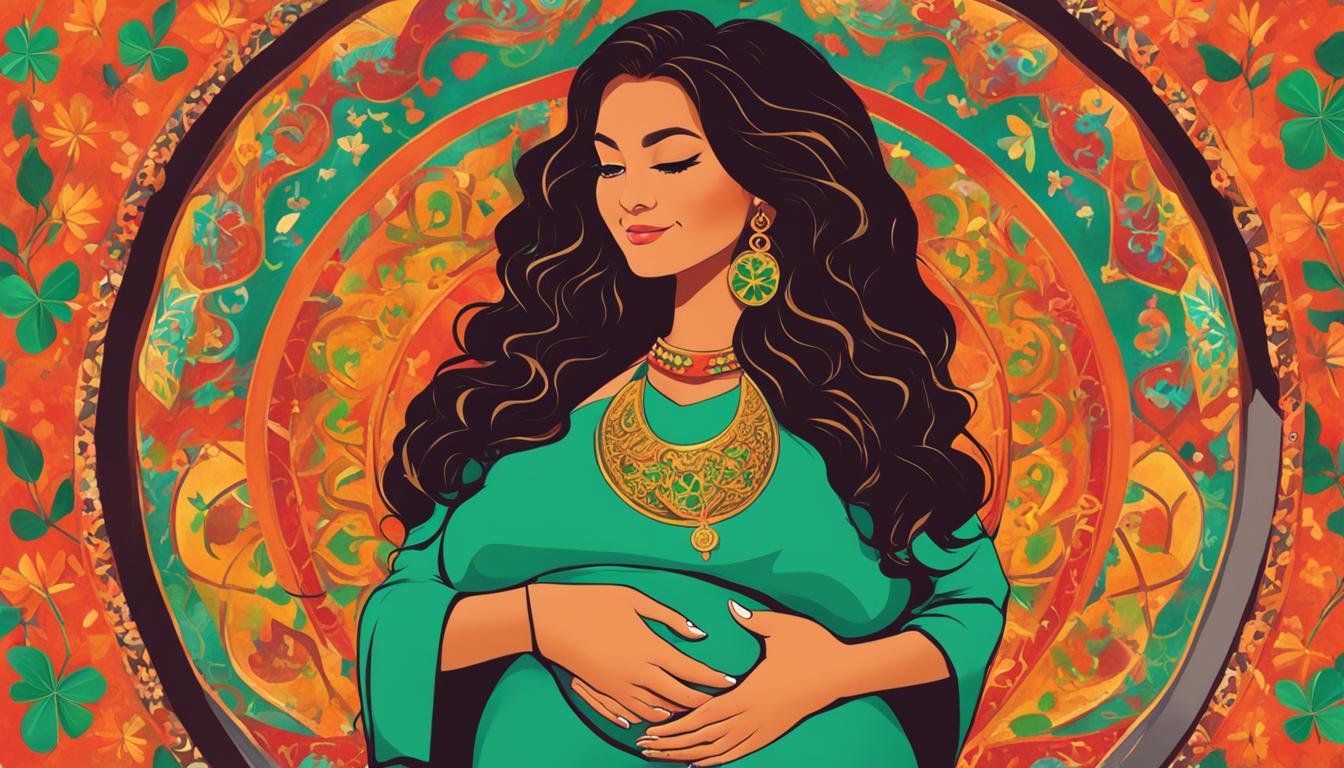In different cultures and superstitions, there are beliefs and practices surrounding pregnant women and the concept of good luck. From African superstitions that discourage strangers from touching a pregnant belly to Chinese traditions that forbid sharp objects near the bed, there are many intriguing customs associated with pregnancy. Explore the fascinating world of pregnancy luck and the positive energy believed to surround expectant mothers.
Contents
- 1 Superstitions and Beliefs Around Pregnant Women in Different Cultures
- 2 Scientific Findings on Pregnancy Myths and Realities
- 3 The Power of Symbolism and Rituals during Pregnancy
- 4 Personal Stories and Perspectives on Pregnancy Superstitions
- 5 Conclusion
- 6 FAQ
- 6.1 Can being around a pregnant woman bring good luck?
- 6.2 What are some superstitions and beliefs around pregnant women in different cultures?
- 6.3 Are there any scientific findings on pregnancy myths and realities?
- 6.4 What is the power of symbolism and rituals during pregnancy?
- 6.5 What are some personal stories and perspectives on pregnancy superstitions?
- 6.6 What is the conclusion about pregnancy superstitions?
- 7 Source Links
Key Takeaways:
- Being around a pregnant woman is believed to bring good luck in various cultures.
- Pregnant women are often considered to have positive energy and attract good fortune.
- Luck charms and rituals during pregnancy are thought to enhance blessings and protection.
- Scientific studies have explored certain beliefs and found some correlations.
- Symbolism and rituals play a significant role in pregnancy customs worldwide.
Superstitions and Beliefs Around Pregnant Women in Different Cultures
Throughout history, different cultures have developed unique superstitions and beliefs surrounding pregnant women. These customs reflect the cultural practices and traditions that have been passed down through generations. Understanding these superstitions provides insight into the diverse ways in which pregnancy is perceived and celebrated around the world.
Superstitions in Liberia
In Liberia, it is believed that evil spirits can steal a baby from the womb. As a result, pregnant women are advised to keep strangers away from their bellies and only allow close family members to touch them.
This belief demonstrates the deep-rooted fear of harm and the protective nature of family bonds in Liberian culture. By limiting access to the pregnant belly, it is believed that the mother and her unborn child are shielded from potential harm.
Customs in Chinese Culture
In Chinese culture, pregnant women are forbidden from having sharp objects near their beds, such as scissors. However, a dagger may be permitted to ward off evil spirits.
This belief highlights the emphasis on spiritual protection during pregnancy. Sharp objects are associated with negative energy and are believed to pose a threat to the well-being of the unborn child. On the other hand, the presence of a dagger is seen as a symbol of protection against evil spirits.
Beliefs in Turkish Culture
In Turkish culture, pregnant women are advised to avoid looking at certain animals, such as camels and monkeys, as it is believed that doing so can lead to the birth of an unattractive baby.
This superstition reveals the significance of physical appearance in Turkish culture. By avoiding the sight of certain animals, pregnant women hope to ensure the beauty and attractiveness of their future child.
| Culture | Belief |
|---|---|
| Liberia | Evil spirits can steal a baby from the womb |
| Chinese | Forbidden to have sharp objects near the bed |
| Turkish | Avoid looking at certain animals to prevent an unattractive offspring |
These examples merely scratch the surface of the numerous superstitions and beliefs surrounding pregnant women in different cultures. They illustrate the fascinating diversity of customs and traditions that exist worldwide, each with its own unique symbolism and significance. By exploring these beliefs, we gain a deeper appreciation for the cultural richness and complexity surrounding pregnancy.
Scientific Findings on Pregnancy Myths and Realities
While many pregnancy superstitions may seem far-fetched, scientific studies have been conducted to explore the validity of certain beliefs and debunk common myths. Understanding the science behind pregnancy can help separate fact from fiction and provide valuable insights into the realities of this life-changing experience.
The Power of Nutrients in Influencing the Sex of the Baby
One fascinating area of study revolves around the idea that a woman’s diet can influence the sex of her baby. Research has shown that certain nutrients in a woman’s diet may have an impact on the likelihood of conceiving a boy or a girl. For example, a study published in the Proceedings of the Royal Society B found that women with higher levels of potassium and sodium in their diets were more likely to have a boy, while those with higher levels of calcium and magnesium were more likely to have a girl. Although the exact mechanism behind this connection is still being explored, it suggests that there may be some scientific basis for the belief that diet can influence the sex of the baby.
The Link Between Tonsils, Appendix, and Fertility
Another intriguing finding is the potential link between a woman’s fertility and the presence or absence of tonsils and appendix. A study published in the journal Fertility and Sterility found that women who had undergone a tonsillectomy or appendectomy had a higher chance of getting pregnant compared to those who had not. While the exact reason for this association is not yet fully understood, it suggests that there may be some relationship between these organs and fertility. However, further research is needed to confirm and unravel the underlying mechanisms.
Psychological Effects of Pregnancy Beliefs
Scientific studies have also explored the psychological effects of pregnancy beliefs and superstitions. Research has found that cultural beliefs and rituals surrounding pregnancy can have a positive impact on a woman’s emotional well-being and coping mechanisms. Believing in the power of rituals or charms can provide a sense of control and security during a time of great uncertainty and change. Additionally, the social support and sense of belonging that come from participating in cultural practices can contribute to a woman’s overall well-being during pregnancy.
| Myth or Superstition | Scientific Finding |
|---|---|
| Avoiding looking at certain animals during pregnancy to prevent producing an unattractive offspring | No scientific evidence supports this belief. Physical appearance is determined by genetics and not influenced by visual exposure during pregnancy. |
| Taking prenatal vitamins with folic acid increases the chances of conceiving twins | While folic acid is important for fetal development, it does not increase the likelihood of conceiving twins. Twin pregnancies are primarily determined by genetics and other factors unrelated to folic acid intake. |
| Wearing a safety pin on clothing can protect the baby from the evil eye | No scientific evidence supports this belief. The evil eye is a cultural superstition and wearing a safety pin cannot provide any physical protection. |
The Power of Symbolism and Rituals during Pregnancy
Pregnancy is a time filled with symbolism and rituals that are believed to bring good luck and positive energy. These practices vary across different cultures and are often passed down from generation to generation. From wearing certain charms and amulets to following specific rituals, expectant mothers embrace these customs to ensure a healthy pregnancy and protect the well-being of their unborn child.
Symbolism plays a significant role in pregnancy beliefs. For example, in many cultures, the moon is seen as a symbol of fertility and femininity. To ward off any negative influences from the moon, some pregnant women wear something metallic, such as a silver or gold bracelet. This ritual is believed to protect the baby and attract positive energy. Other symbols, such as the horseshoe or the evil eye talisman, are also thought to bring good luck and ward off any potential harm.
“During my pregnancy, I wore a small silver locket with a picture of a moon inside. It was passed down to me by my grandmother, who believed it would protect the baby and bring good luck. It became a cherished symbol of my journey through motherhood.” – Sarah, expectant mother
Rituals are another essential aspect of pregnancy superstitions. These rituals often involve avoiding certain activities or foods, or performing specific actions to ensure a healthy and lucky pregnancy. In some cultures, expectant mothers refrain from attending funerals or visiting cemeteries to protect the baby from any negative energies associated with death. Others engage in food-related rituals, such as indulging in specific cravings or avoiding certain foods, with the belief that it will influence the baby’s physical characteristics or prevent the development of birthmarks.
To enhance the positive energy, many pregnant women also turn to pregnancy charms and amulets. These can be in the form of jewelry, such as a pendant or a bracelet, or small objects that are carried or placed near the belly. Common charms include the fertility goddess, the hand of Fatima, or the elephant, which are believed to bring luck, protection, and abundance during pregnancy. Some cultures also believe in the power of natural objects, such as stones or herbs, which are carried or worn as amulets to attract positive energy and ward off any potential harm.
| Symbol | Meaning |
|---|---|
| Moon | Fertility and femininity |
| Horseshoe | Good luck and protection |
| Evil eye talisman | Protection from negative energies |
The power of symbolism and rituals during pregnancy goes beyond mere beliefs. These customs provide a sense of comfort, connection to tradition, and a way to navigate the uncertainties of pregnancy and motherhood. Whether they have a scientific basis or are purely symbolic, these practices serve as a source of strength and hope for expectant mothers around the world.
Personal Stories and Perspectives on Pregnancy Superstitions
When it comes to pregnancy superstitions, personal experiences and anecdotes provide a window into the significance and impact of these beliefs. Each individual may have their own unique story to share, influenced by cultural traditions, family values, or personal beliefs. These stories offer insights into the diverse perspectives surrounding pregnancy rituals and customs.
Take, for example, Emily, a young expectant mother who grew up in a family deeply rooted in Mexican culture. She recalls her grandmother insisting that she wear a red ribbon around her belly to protect her unborn child from the evil eye. Although Emily doesn’t necessarily believe in the superstition, she complied out of respect for her family’s traditions and the love she has for her grandmother.
On the other hand, Sarah, a first-time mother from a modern urban setting, approaches pregnancy superstitions with a more skeptical mindset. While she acknowledges the cultural significance of certain customs, she views them as interesting folklore rather than concrete beliefs. Sarah chooses to focus on maintaining a healthy lifestyle and positive mindset throughout her pregnancy, prioritizing evidence-based medical advice over superstitions.
“I think it’s fascinating how different cultures have their own unique beliefs and practices when it comes to pregnancy. While some superstitions may have a scientific basis, others are purely rooted in tradition and symbolism. It’s important to respect and appreciate the diversity of these customs, even if we don’t personally adhere to them.”
These personal stories and perspectives highlight the nuanced nature of pregnancy superstitions. While some individuals may wholeheartedly embrace these customs, others may approach them with curiosity or skepticism. Regardless of one’s stance, pregnancy superstitions provide a glimpse into the rich tapestry of human beliefs and traditions surrounding the miraculous journey of motherhood.

Table: Pregnancy Superstitions Around the World
| Country/Region | Superstition |
|---|---|
| Mexico | Wearing a red ribbon around the belly to protect against the evil eye |
| India | Avoiding eating papaya, believed to cause miscarriage |
| Japan | Avoiding the number four due to its association with death and bad luck |
| Nigeria | Abstaining from eating snails to prevent a difficult delivery |
The table above showcases a few examples of pregnancy superstitions from different countries. These beliefs vary widely and reflect the cultural diversity and rich tapestry of human traditions.
Conclusion
In conclusion, pregnancy superstitions and beliefs are an intriguing aspect of diverse cultures worldwide. They offer a glimpse into the rich tapestry of human traditions and customs surrounding pregnancy and motherhood. While some superstitions may have scientific explanations, others retain their cultural and symbolic significance.
It is important to recognize that these beliefs hold different meanings for individuals. Some may choose to embrace them as an integral part of their cultural or family heritage, while others may approach them with skepticism. Regardless of personal perspectives, pregnancy superstitions serve as a window into the human experience and the ways in which people navigate the mysteries of pregnancy.
The cultural diversity present in pregnancy customs further highlights the beauty of our world. Each tradition brings its own unique rituals, symbols, and practices that are cherished and passed down through generations. By embracing and celebrating this diversity, we can foster a greater understanding and appreciation for the varying beliefs surrounding pregnancy.
FAQ
Can being around a pregnant woman bring good luck?
While there is no scientific evidence to support the idea that being around a pregnant woman can bring good luck, many cultures have beliefs and practices that associate positive energy and good fortune with expectant mothers.
What are some superstitions and beliefs around pregnant women in different cultures?
Different cultures have various superstitions and beliefs surrounding pregnancy. For example, in Liberia, expectant mothers are advised to only allow close family members near their bellies to prevent evil spirits from stealing the baby. In Chinese culture, sharp objects like scissors are forbidden near the bed to ward off evil spirits.
Are there any scientific findings on pregnancy myths and realities?
Some scientific studies have shed light on certain pregnancy beliefs. For instance, research has found that women without tonsils or appendixes may be more fertile, although the exact reason is unknown. Additionally, studies suggest that specific nutrients in a woman’s diet may be linked to the sex of the baby.
What is the power of symbolism and rituals during pregnancy?
Symbolism and rituals play a significant role in pregnancy beliefs and practices across cultures. These rituals and symbols are thought to attract positive energy and ensure a healthy pregnancy. For example, wearing something metallic in Aztec culture is believed to ward off the moon’s rays, while indulging in food cravings is believed to prevent birthmarks.
What are some personal stories and perspectives on pregnancy superstitions?
Personal experiences and perspectives on pregnancy superstitions can vary. Some individuals adhere to traditional practices due to cultural or family values, while others may view them as mere superstitions. Personal stories and anecdotes provide insights into the significance and impact of these beliefs in individuals’ lives.
What is the conclusion about pregnancy superstitions?
The diversity and richness of human traditions are reflected in the deeply ingrained superstitions and beliefs surrounding pregnancy. While some superstitions may have scientific explanations, others remain rooted in cultural and symbolic significance. Whether one chooses to embrace or question these beliefs, they offer insights into the human experience and the ways in which people navigate the mysteries of pregnancy and motherhood.
Source Links
- https://www.cnn.com/2017/06/28/health/science-pregnancy-superstitions-partner/index.html
- https://i.stuff.co.nz/life-style/parenting/pregnancy/88535413/13-pregnancy-superstitions-from-across-the-globe
- https://www.washingtonpost.com/news/parenting/wp/2015/10/22/i-was-pregnant-at-a-funeral-and-superstitious-did-i-mention-superstitious/





